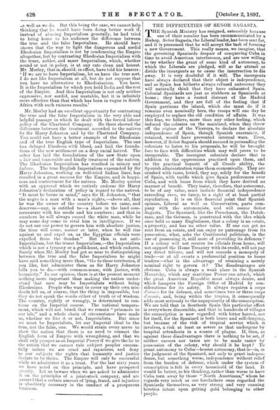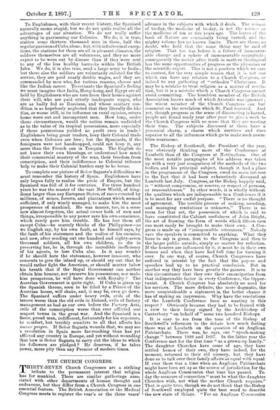THE DIFFICULTIES OF SENOR SAGASTA. T HE Spanish Ministry has resigned,
ostensibly because one of their number has been excommunicated by a Bishop. Senor Sagasta, the Liberal leader, has been sent for, and it is presumed that he will accept the task of forming a new Government. This really means, we imagine, that the governing Spaniards despair of conquering Cuba in time to avoid American interference, and are now willing to try whether the grant of some kind of autonomy, to which the Liberals are pledged, will so far attract or divide the insurgents as to cause the insurrection to die away. It is very doubtful if it will. The insurgents have always declared that their object is independence, and as Spain has hitherto always refused autonomy they will naturally think that they have exhausted Spain. Colonial Spaniards are just as stubborn as Spaniards at home ; they have a rooted distrust of the Madrid Government, and they are full of the feeling that if Spain garrisons the island, which she must do if it remains even nominally hers, the troops will one day be employed to replace the old condition of affairs. It was this fear, we believe, more than any other feeling, which induced the colonies on the mainland, when they threw off the regime of the Viceroys, to declare for absolute independence of Spain, though Spanish suzerainty, if retained, would have prevented internal wars. Even, however, if Senor Sagasta should succeed in persuading the colonists to listen to his proposals, he will be brought face to face with difficulties which may well prove to be insuperable. The insurgent colonists declare that in addition to the oppressions practised upon them, and to the practical boycott of all Creole ability, the Spanish administration ruins them economically. They are crushed with taxes, levied, they say, solely for the benefit of Spain, with tariffs which give Spain preferences over Cuba, and with loans from which they have derived no manner of benefit. They insist, therefore, that autonomy, to be of any value, must include financial independence extending even, we fancy, to a right of at least partial repudiation. It is on this financial point that Spanish opinion, Liberal as well as Conservative, parts com- pany with the autonomists, and will coerce Senor Sagasta. The Spaniard, like the Frenchman, the Dutch- man, and the German, is penetrated with the idea which once held so many Englishmen, that a colony is an estate, a property, and has no other value. If one can get no rent from an estate, and can enjoy no patronage from its possession, what, asks the Continental politician, is the use of possessing it, still more of providing its defences ? If a colony will not receive its officials from home, will not support the Home Treasury with its credit, will not pay any direct tribute, and will not concede a monopoly of trade—or at all events a preferential position to home traders—what is the advantage of retaining a merely nominal right to govern it ? The disadvantages are obvious. Cuba is always a weak place in the Spanish Monarchy, which any maritime Power can attack, which the great American Republic must always desire, and which hampers the Foreign Office of Madrid by con- siderations for its safety. It always requires a corps d'armee for its defence, and sometimes two or three corps d'arinee, and, being within the tropics, it consequently adds most seriously to the unpopularity of the conscription. We are told that in Southern Spain this particular effect is everywhere discernible, and that in hundreds of villages the conscription is now regarded with bitter hatred, not for itself, for the Spaniard is both brave and self-denying, but because of the risk of tropical service which it involves, a risk at least as severe as that undergone by hospital attendants in a season of plague. If, then, as against these disadvantages there is nothing to be set, if neither careers nor taxes are to be made easier by possession of the colony, why should it be kept ? To grant autonomy to Cuba—honest autonomy, that is—is, in the judgment of the Spaniard, not only to grant indepen- dence, but something worse, independence without relief from the burden of defence, which under the system of conscription is felt in every household of the land. It would be better, to his thinking, rather than worse to have Cuba torn away by those " North Americans," whom he regards very much as our forefathers once regarded the Spaniards themselves, as very strong and very cunning heretics intent upon getting gold belonging to other people. To Englishmen, with their recent history, the Spaniard naturally seems stupid; but we do not quite realise all the advantages of our situation. We do not really suffer anything in garrisoning our Colonies. We do, it is true, station some thirteen thousand men in them, half the regular garrison of Cuba alone; but, with infinitesimal excep- tions, the stations for them are all in pleasant climates, the soldiers themselves are all volunteers, and they no more expect to be worn out by disease than if they were sent to any of the less healthy barracks within the British Isles. We do, it is also true, send a large army to India; but there also the soldiers are voluntarily enlisted for the service, they are paid nearly double wages, and they are commanded by men who, for various reasons, choose and like the Indian career. To estimate the Spaniard's feeling we must imagine that India, Hong-kong, and Egypt are all held by Englishmen who are torn from their homes against their will, who are paid utterly inadequate wages, who are as badly fed as Russians, and whose sanitary con- dition is so hopelessly neglected that they literally die like flies, or worse still, in its influence on rural opinion, return home worn out and incompetent men. How long, under those circumstances, would the nation remain undivided as to the value of its tropical possessions, more especially if those possessions yielded no profit even in trade ? Englishmen being great traders, keep their Colonial trade even when Colonies are free ; but the Spaniards, if the foreigners were not handicapped, could not keep it, any more than the French can in Tonquin. The English do not know their own blessings, or understand how much their commercial mastery of the seas, their freedom from conscription, and their indifference to Colonial tributes help to make their Colonial burden easy to be borne.
To complete our picture of Senor Sagasta's difficulties we must remember the history of Spain. Englishmen have only begun fully to realise the pride of Empire, but the Spaniard was full of it for centuries. For three hundred years he was the master of the vast New World, of king- doms larger than any European States, of races counted by millions, of mines, forests, and plantations which seemed sufficient, if only wisely managed, to make him the most prosperous of mankind. He was master, too, in a sense now almost forgotten, the actual owner both of men and things, irresponsible to any power save his own conscience, which rarely gave him trouble. He has lost them all except Cuba—he scarcely thinks of the Philippines—as we English say, by his own fault, as he himself says, by the fault of his statesmen and the malice of his enemies, and now, after sending out one hundred and eighty-seven thousand soldiers, all his own children, to die in preserving her, he is, through the incredible inefficiency of his agents, to lose Cuba also. Is it any wonder if he should hate the statesman, however innocent, who consents to give the island up, or should cry out that he would rather fight the American, or should mutter below his breath that if the Royal Government can neither obtain him honour, nor preserve his possessions, nor make him prosperous, he will have done with Royalty ? The Austrian Government is quite right. If Cuba is given up the Spanish throne, soon to be filled by a Prince of the Austrian house, will shake, and, it may be, even go down. The Spaniard suffers under heavy evils, evils of the tenure worse than the old evils in Ireland, evils of factory management as bad as our own before the Factory Acts, ?Nils of the conscription worse than ever afflicted our seaport towns in the great war. And the Spaniard is a fierce, proud man, indifferent, fortunately for his superiors, to comfort, but terribly sensitive to all that affects his amour propre. If Senor Sagasta wounds that, we may see a revolution in Spain more far-reaching than has yet afflicted any country in Europe, and yet without wounding that how is Senor Sagasta to carry out the ideas to which his followers are pledged ? He deserves, if he takes power, more pity than any Premier of modern times.







































 Previous page
Previous page